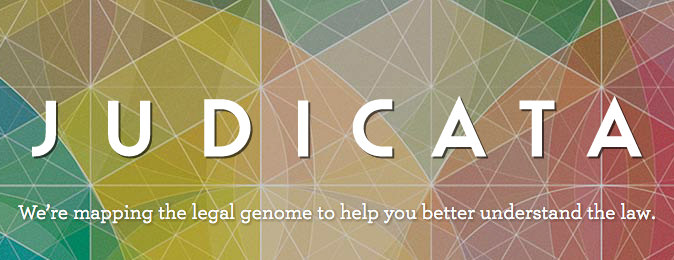Westlaw and LexisNexis have dominated the online legal research field for decades. Although technology has innovated almost every aspect of our lives, it has seemed to skip over legal research entirely, a field that still feels clunky, antiquated, and counter-intuitive. Lawyers often spend too much of their time searching for and sifting through cases—a practice that not only gets expensive for clients, but also takes time away from the actual work of a lawyer, crafting arguments. Enter Judicata, a startup that hopes to change the way we conduct legal research. With advanced search analytics and a more intuitive design, Judicata hopes to make legal research easier and more efficient, affording lawyers the time to do the real work of lawyering. I spoke with Itai Gurari, CEO and co-founder of Judicata, to find out how Judicata aims to change the landscape of legal research.
What is Judicata?
There are two ways of presenting what we offer—one is in terms of what we offer to lawyers, and one is in terms of what we spend most of our time doing. In terms of what we offer lawyers, it’s advanced search analytics. On the search side we build structured data that we expose in simple, intuitive ways to search. So instead of dealing with a keyword search where the user has to type in the words, look through the results, modify the query, play around with and generally review results for a very long time, what they do on Judicata is very much like shopping. Say you’re shopping for shoes, you just click on the checkbox for sneakers then select puma, red, size 9.5, so on, it’s all structured data which you can quickly query. So that’s what we’re offering from the user perspective. And analytics on top of that—like what arguments work better or worse in front of which judges. What we spend most of our time doing is mapping the legal genome, which is to say focusing on taking this unstructured legal text and adding structure to it.
What does it mean to “map the legal genome”?
It amounts to putting structure to unstructured legal text; language that we could read through and it makes a lot of sense, but for a computer it’s just unstructured words. So we identify the structure there in two ways. On a micro level, on a per document basis—per case, per statute—we go through and we parse out the language, we identify everything from the sentence structures to citations to what the court’s opinion was, the legal disposition of the case, the legal principles at issue, and even the facts. All those pieces of data are then “tagged” and delimited within the document and assigned values. We actually “map out” what’s going on in each document. On a macro level, we create a more holistic, ontological outline-like understanding of the law. We distinguish all these different points of law and how they’re related, and the micro and the macro intersect on a point of law basis where for any given rule or point of law we know what cases apply.
What is the difference between Judicata and Lexis Nexis or Westlaw, from a user’s perspective?
It’s easier to search. So, for example, if you’re going to run a search for employment harassment cases, you’ve got to type in the queries for employment harassment and look through, like, 250+ results. Say you run a search for race harassment summary judgment, looking for a case or set of cases. You’re going to get more than 250 results on Westlaw Next, but the vast majority of the results are not race harassment cases on appeal from summary judgment. Whereas with us, what you would do is say I’m interested in the harassment rule in California. You’d go to that rule’s page and then you’d click the checkbox for race harassment, as opposed to sex harassment, and that’s going to bring you down to around 40 cases. Then you’re going to select the checkbox for appeals from summary judgment and that’s going to reduce you to 22 results. So as opposed to getting 250 results, which the user then has to read through, we’re giving them 22 precise results.
The problem is that the user has to do all the work. For a lawyer to have to read through 100 cases, the vast majority of which are irrelevant is a loss of money and time and it’s very unfortunate—people shouldn’t have to waste so much time like that.
So how do you think Judicata will change the way that law is practiced?
It’s mostly an efficiency tool. You can find your results drastically faster, and find better results, enabling you to make arguments you maybe couldn’t make otherwise, because you couldn’t find the cases. The analytics will really start to help people understand what arguments are better to make and how to make them based on the facts, and the judge, and the court. Ultimately, once there is this structure in place where we have a deeper understanding of the law, we can really help people craft better arguments.









